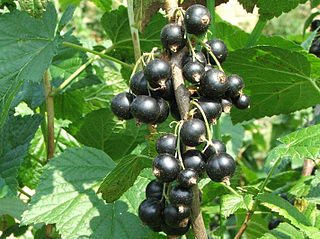
The blackcurrant, also known as black currant or cassis, is a deciduous shrub in the family Grossulariaceae grown for its edible berries. It is native to temperate parts of central and northern Europe and northern Asia, where it prefers damp fertile soils. It is widely cultivated both commercially and domestically.
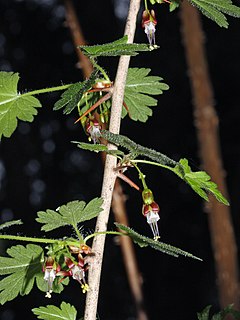
Ribes is a genus of about 200 known species of flowering plants, most of them native to the temperate regions of the Northern Hemisphere. The various species are known as currants or gooseberries, and some are cultivated for their edible fruit or as ornamental plants. Ribes is the only genus in the family Grossulariaceae.
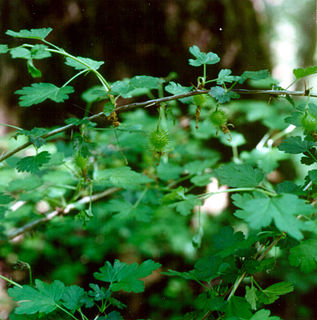
Ribes echinellum, the Miccosukee gooseberry, is a very rare North American shrub in the currant family, native to the southeastern United States. It has only a few known populations. The Florida populations were discovered first, in 1924 at Lake Miccosukee. The South Carolina populations were found in 1957 and 1981, and the first is protected at Steven's Creek Heritage Preserve.

The jostaberry is a complex-cross fruit bush in the genus Ribes, involving three original species, the blackcurrant R. nigrum, the North American coastal black gooseberry R. divaricatum, and the European gooseberry R. uva-crispa. It is similar to Ribes × culverwellii, the jochelbeere, which is descended from just two of these species, R. nigrum and R. uva-crispa.

Ribes missouriense, the Missouri gooseberry, Missouri currant or wild gooseberry, is a prickly, many-stemmed shrub native to the north-central United States. Scattered populations have been found farther east, most of them very likely escapes from cultivation.
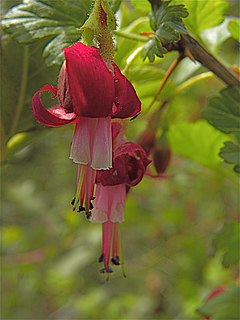
Ribes lobbii is a shrubby, deciduous, shade-intolerant perennial dicot found on the western coast of North America. It was first described in 1876 by Asa Gray. The specific epithet was a dedication to the English plant collector William Lobb.

Ribes divaricatum is a species in the genus Ribes found in the forests, woodlands, and coastal scrub of western North America from British Columbia to California. The three accepted varieties have various common names which include the word "gooseberry".
Ribes amarum is a species of currant known by the common name bitter gooseberry. It is endemic to California, where it is known from mountains, foothills, and canyons. Its habitat includes Chaparral.

Ribes californicum, with the common name hillside gooseberry, is a North American species of currant. It is endemic to California, where it can be found throughout many of the California Coast, Transverse, and Peninsular Ranges in local habitat types such as chaparral and woodlands.

Ribes inerme is a species of currant known by the common names whitestem gooseberry and white stemmed gooseberry. It is native to western North America from British Columbia to California and westward to the Rocky Mountains. It grows in mountain forests, woodlands, and meadows.

Ribes montigenum is a species of currant known by the common names mountain gooseberry, alpine prickly currant, western prickly gooseberry, and gooseberry currant. It is native to western North America from Washington south to California and east as far as the Rocky Mountains, where it grows in high mountain habitat types in subalpine and alpine climates, such as forests and talus. It is a spreading shrub growing up to 1.5 meters tall, the branching stems covered in prickles and hairs and bearing 1 to 5 sharp spines at intervals.

Ribes roezlii is a North American species of currant known by the common name Sierra gooseberry.

Ribes velutinum is a species of currant known by the common name desert gooseberry.
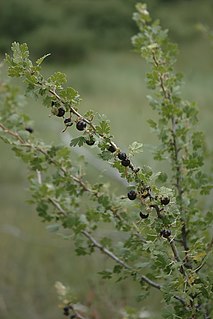
Ribes leptanthum is a spiny-stemmed, small-leaved species of gooseberry in the genus Ribes commonly called trumpet gooseberry. It is native to Arizona, Colorado, New Mexico, Texas, and Utah, where it is usually found in high-altitude canyons.
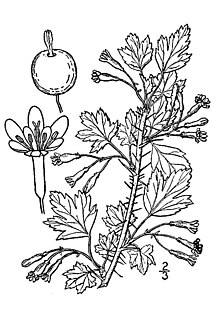
Ribes oxyacanthoides is a species of flowering plant in the gooseberry family known by the common name Canadian gooseberry. Its various subspecies have common names of their own. It is native to North America, where it occurs in Alaska through much of Canada and the western and north-central United States.
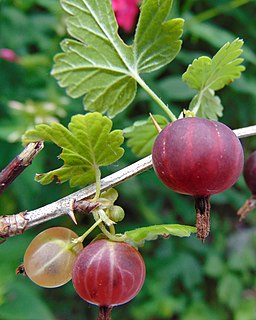
Ribes hirtellum is a species of gooseberry commonly known as wild gooseberry or swamp gooseberry. It is native to Canada and the northern United States. Cultivated gooseberries are derived from this species and from Ribes uva-crispa.
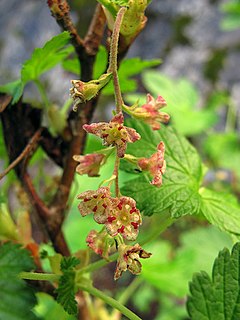
Ribes acerifolium is a North American species of currant known by the common names mapleleaf currant and maple-leaved currant. It is native to the Canadian Province of British Columbia as well as to the northwestern United States.

Ribes curvatum is a North American species of currant known by the common names granite gooseberry, drooping gooseberry and Georgia gooseberry. It is native to the southeastern and south-central United States, and can be found in habitats ranging from dry rocky slopes to rich woodlands.
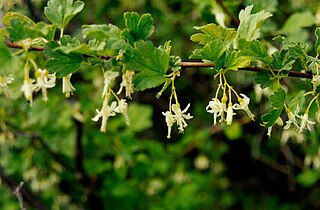
Ribes niveum is a North American species of currant known by the common names snowy gooseberry, white-flowered gooseberry, or snow currant. It is native to the western United States.
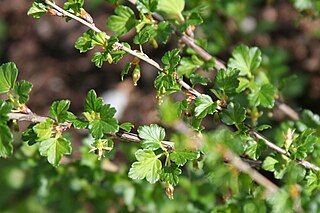
Ribes rotundifolium is a North American species of currant known by the common names wild gooseberry and Appalachian gooseberry. It is native to the eastern United States, primarily the Adirondacks, from Massachusetts and the Appalachian Mountains south as far as South Carolina and Tennessee.


















